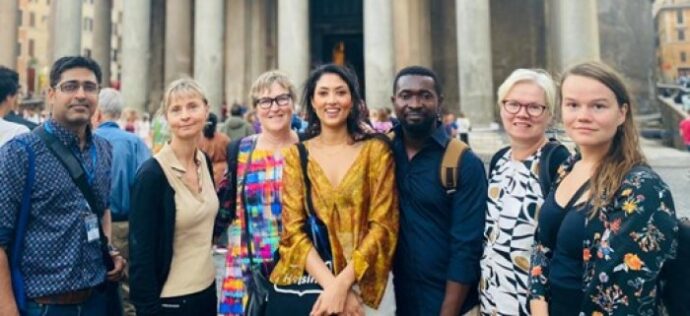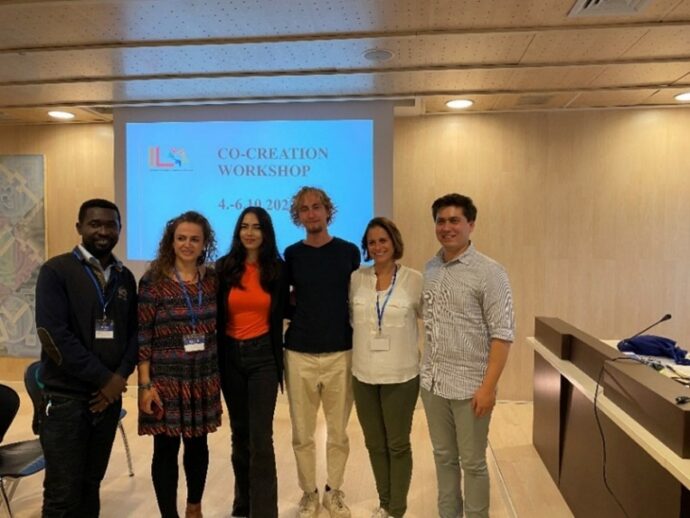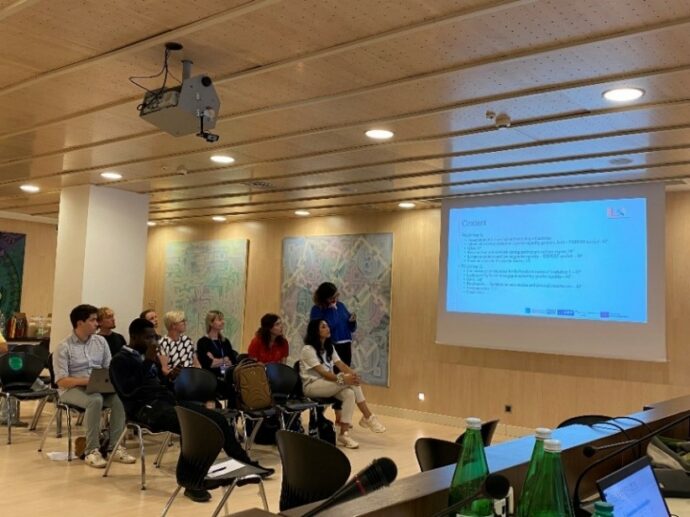Even today Europe is filled with many talented and well-educated migrants who are not able to share their expertise and skills in higher education institutions. The Erasmus+ project ILO (Intercultural Learning Online, 2022-2024), led by Laurea, is a good example of an international co-operation project that has succeeded in inviting highly educated migrants to participate in different educational university activities as lecturers and presenters in Finland, Belgium, Netherlands, Greece, and Italy. Such win-win activities promote the employment possibilities for talented migrants and give space to their much-needed skills in European scientific and educational communities.
 ILO Co-Creation Workshop in Rome, 2022. Picture credit: Minttu Räty, Laurea.
ILO Co-Creation Workshop in Rome, 2022. Picture credit: Minttu Räty, Laurea.
This article describes some of the key points about such co-operation, realized during an intercultural Laurea course with ILO lectures and workshops, that might help also other actors planning to integrate migrant lecturers in their educational activities.
Shortly about the Erasmus+ project ILO
In 2020, the European Commission presented the new EU Action Plan on Integration and Inclusion (2021-2027) that focuses on promoting employment opportunities and skills recognition to fully value the contribution and merit of migrant communities, thus ensuring that they are supported to reach their full potential. Following this EU Action Plan by making visible the varied skills and expertise of highly educated European immigrants, the ILO project supports their employment and integration in Europe and increases their opportunities to become active members of university communities in Finland, Netherlands, Italy, Greece, and Belgium. The ILO European partners include Maastricht University, Roma Tre University, Aristotle University of Thessaloniki, European Migrant Platform, and Laurea University of Applied Sciences.
 ILO Co-Creation Workshop in Rome, 2022. Picture credit: Minttu Räty, Laurea.
ILO Co-Creation Workshop in Rome, 2022. Picture credit: Minttu Räty, Laurea.
Between 2022-2024, the ILO project partners are organizing different shared courses, lecture series, workshops and panels where highly educated migrants can make visible their talents for example on such topics as interculturality, resilience, sustainable future business, social enterprises and leadership as well different co-creation methods. They are also invited to share their personal narratives that are of great importance when trying to understand the present European multicultural landscape. These types of activities are a win-win situation for all the participants – the migrants get much needed opportunities for lecturing and networking, the students get new views on intercultural and sustainability-related topics, and the university teaching staff learn new ways of co-operating with European migrants.
Flexibility and support when creating joint sessions
When starting to plan the shared lecture and workshop activities with different migrant lecturers, it is always good to have an open and flexible mindset and a desire to support the migrants in co-teaching activities. Giving enough time and space for ideation and planning brings always better results, and one needs to be prepared to give the necessary support for the visitors who are not familiar with the specific regulations and practices of varied European universities; what is maybe obvious for us might not be so for others. It is better to overexplain than just assume things.
It is natural that there will be different levels of academic and other skills both for the speakers and the audiences, and there are also cultural differences in teaching and learning styles. So, these topics might need to be addressed as well. In addition, it is good to analyze the needs of Bachelor and Master level courses as well as science university requirements versus the needs of universities of applied sciences.
Yet, it is also important to allow the presenters to talk about such themes that are meaningful and inspiring to them rather than just too strictly follow for example the curriculum or the course description. In this way, the presentation and following discussions can bring new, unexpected, and inspiring learning experiences for all those involved. Also, the migrant lecturers can bring fresh views for example on different intercultural topics, based on their personal experiences, and students often greatly appreciate these personal life stories and the possibility to engage in a dialogue with the lecturers. Oftentimes, the best stories are shared when creative freedom is allowed.
What about during and after the joint sessions?
 ILO Co-Creation Workshop in Rome, 2022. Picture credit: Minttu Räty, Laurea.
ILO Co-Creation Workshop in Rome, 2022. Picture credit: Minttu Räty, Laurea.
There are also different points to consider during and after the joint sessions. During the sessions, it is good to have “a plan B” available at all times – anything can and may happen and things might quickly change for example with technology, especially if the speakers join online from different countries. So, patience and commitment are required from all the participants. It is also good to be prepared to use extra hours throughout the process – even if someone else delivers the class, you still need to be actively there and support the whole process.
Also, it might be a good idea to prepare the students beforehand, so they know what to expect. For example, one might need to explain certain things to bridge the gap of expectations – the students might have certain thematic or language skills expectations to migrant lecturers (or any lecturers for that matter), so it is wise to encourage flexibility and an open mind when noticing cultural differences. In addition, students might still be used to remain in the silos of their particular field of study, wondering what the importance of this topic is to them and their future working lives. Thus, the relevance of broad intercultural understanding and understanding of for example different sustainability-related themes can be discussed with the students prior the shared courses and workshops.
After the joint sessions, it is time for feedback that most probably will be both positive and somewhat critical, as usual. Here too the critical tones can be used for improving the shared courses or workshops, and the positive feedback needs to be also shared with the presenter for inspiration and encouragement. Another topic related to feedback is the feedback form – how to collect feedback from different formats of learning, such as co-teaching, lectures, or workshops. Different electronic forms might help when gathering fast the necessary feedback, but one might also wish to use for example learning diaries to collect more qualitative feedback for further development. Below there are some examples of the feedback provided by the ILO students. It is good to reserve enough time for feedback discussions afterwards, as there might be different issues or questions and feelings that need to be processed after the lectures and workshops. And finally, as in life, we cannot control everything, and often these surprise elements offer us the best learning moments.
The Erasmus+ project ILO warmly encourages all to find new and interesting forms of joint European learning with our talented migrants.
Some student Learning Diary comments after Erasmus+ ILO migrant lecturers’ presentations and workshops:
In the final seminar, our group came up with the idea of creating an anti-discrimination platform. Since all our group members were deeply impressed by the guest lecturer on the topic of discrimination, we decided to use this topic to create a product or service based on it.
I had not thought about sustainable finance this way, I need to keep this in mind for later use also in my work.
Could the reasons for the high unemployment rate of non-native people be summed up as racism, discrimination, and no networks?
Sources: